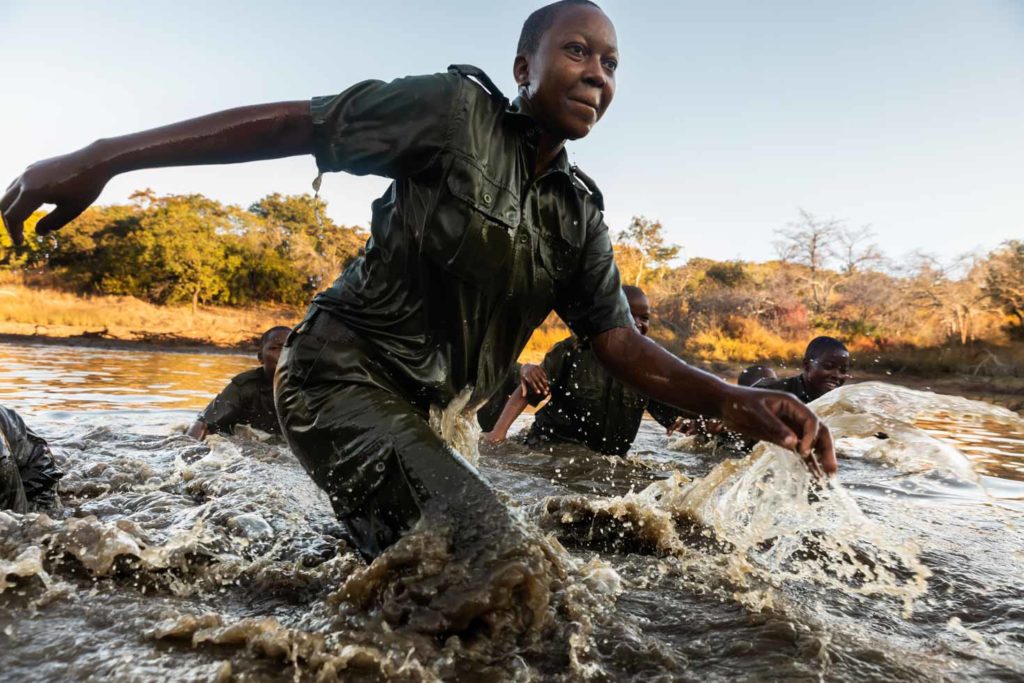From the business world to the bush, women are shattering glass ceilings. Today, we honour a very special field of female forces who are anti-poaching rangers, on the first-ever World Female Ranger Day. The day spotlights African women on the frontlines of conservation, protecting our vulnerable wildlife.
If the notion sounds familiar, you’re not mistaken. World Ranger Day is to be celebrated on July 31, however, June 23 has been set aside especially for the ladies – because they deserve it!
According to The African Insider, research has indicated that male ranger forces are more likely to be hampered by corruption, nepotism, drunkenness or aggressiveness towards local communities with a sense of entitlement.
The International Anti-Poaching Foundation, led by former Australian Special Forces soldier, Damien Mander decided to innovate. In 2017, it was decided that an all female team would manage an entire nature reserve in Zimbabwe (the Akashinga group).
“The program builds an alternative approach to the militarized paradigm of ‘fortress conservation’ which defends colonial boundaries between nature and humans,” says The African Insider.

The Black Mambas are South Africa’s first all-female anti-poaching unit. They are a pack of young African women who patrol 50,000 hectares of the Balule Nature Reserve, part of the Greater Kruger National Park – an area worse hit by rhino poaching than any other place in the world.
The objectives of the Black Mambas is not only the protection of rhinos through boots on the ground and a presence on the frontline, but also through being a role model in their communities, says Helping Rhinos.

These legendary ladies are masters of their land, decoding the wild for those who pass through on holidays and brief excursions. Luxuries of learning aside, female rangers are always on the move, never afraid to get a bit of dirt beneath their nails.
Part of the job includes managing animal populations, maintaining roads and fences, barring off poachers, and interacting with the public and local communities to create an environment whereby African wildlife is celebrated, understood, protected and preserved.
International charity, How Many Elephants, are behind the promotion of the first World Female Ranger Day. The purpose of the celebration is to recognise these rangers collectively on a global interactive and fundraising-focused platform. It’s about real stories, opening up a channel of support, advice, and knowledge-sharing.
National Geographic indicated that women in developing countries invest 90% of their income in their families, compared to the 35% generally contributed by men.
“It’s one of many reasons that these role models and educators are transforming attitudes and proving the capabilities and success of females in traditionally male roles,” says The African Insider.
The stats have undoubtably been affected by the COVID-19 pandemic, which has crippled the tourism industry and funding for conservation projects within Africa and globally.
“Many have lost jobs or faced significant salary cuts. The knock-on effect of this is enormous. In many regions, one ranger alone may support up to 16 family members,” continued The African Insider.
One major downfall of this knock-on-effect is less feet on the ground and less protection for our wildlife. The lack of vigilance is a scary reality to consider alongside the extremely fragile state of our wild animal populations and poaching statistics.
So, how can you support female rangers on this debut day? The African Insider shared three goodies:
1. Become a ranger for the week.
Think you have what it takes to be a ranger? Step into the boots of a wildlife ranger and see what it’s like to patrol every day, across vast distances. A ranger covers around 20km per day. How many can you do? Choose your challenge at a time that suits you. See each distance challenge here.
2. Send a message of support to the female rangers in Africa.
Head on over the World Female Ranger Day website and share your support. Say why you admire them. Share an anecdote. Ask a question.
3. Celebrate the work of a female ranger and nominate them.
Know someone working in the field? Share why they deserve to win the World Female Ranger Award. Closing date for nominations: 31st July 2021 | The award recipient will be announced: 25th August 2021.
Additionally, you can donate to Akashinga group here and the Black Mambas group here.
Picture: The African Insider by Brett Stirton.

